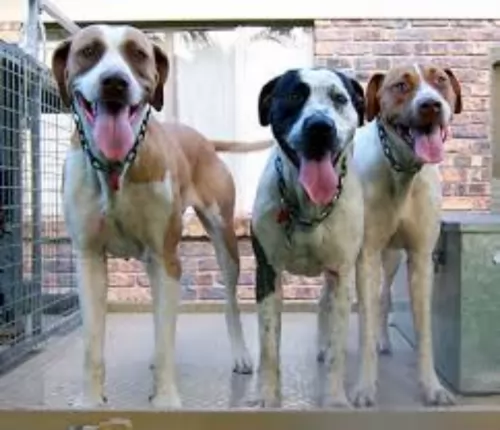 Petzlover
Petzlover Bull Arab is originated from Australia but Shetland Sheepdog is originated from United Kingdom. Bull Arab may grow 28 cm / 12 inches higher than Shetland Sheepdog. Bull Arab may weigh 38 kg / 84 pounds more than Shetland Sheepdog. Both Bull Arab and Shetland Sheepdog has almost same life span. Bull Arab may have more litter size than Shetland Sheepdog. Bull Arab requires Low Maintenance. But Shetland Sheepdog requires Moderate Maintenance
Bull Arab is originated from Australia but Shetland Sheepdog is originated from United Kingdom. Bull Arab may grow 28 cm / 12 inches higher than Shetland Sheepdog. Bull Arab may weigh 38 kg / 84 pounds more than Shetland Sheepdog. Both Bull Arab and Shetland Sheepdog has almost same life span. Bull Arab may have more litter size than Shetland Sheepdog. Bull Arab requires Low Maintenance. But Shetland Sheepdog requires Moderate Maintenance
 In the 1970’s feral pig hunters wanted a dog that could be aggressive in finding and capturing the pigs. The hunters crossed the German Shorthaired Pointer, the Bull Terrier and the Greyhound to develop the Bull Arab. It is believed that the hybrid is at least 50% Bull Terrier. It is also possible that there is some Doberman, Mastiff, Great Dane and/or Pointer in the hybrid as well.
In the 1970’s feral pig hunters wanted a dog that could be aggressive in finding and capturing the pigs. The hunters crossed the German Shorthaired Pointer, the Bull Terrier and the Greyhound to develop the Bull Arab. It is believed that the hybrid is at least 50% Bull Terrier. It is also possible that there is some Doberman, Mastiff, Great Dane and/or Pointer in the hybrid as well.
The job of the Bull Arab is to hunt out the feral pigs, grab one by the ear and hold it until the hunter arrives. They have a strong sense of smell and that is how they find the pigs.
Mike Hodgens, an Australian, developed the hybrid and added some Bloodhound as well to get that ability to smell out the pigs at great distances. They are also capable of catching buffalo and cattle. Some Australians use the breed in cattle or buffalo ranching. They are registered with the DRA or Dog Registry of America, Inc.
 The Shetland Sheepdog was crossed with working collies and brought to the islands. They were bred on the Shetland Islands, United Kingdom.
The Shetland Sheepdog was crossed with working collies and brought to the islands. They were bred on the Shetland Islands, United Kingdom.
These little dogs have always been particularly valuable to farmers who used them to herd their sheep.
During the early 20th century other crosses occurred an in 1909 and the little dog received recognition by the English Kennel Club. The first Sheltie to be registered by the American Kennel Club was in 1911.
 Mike Hodgens succeeded in developing a powerful, well built dog. The Bull Arab has a powerful head and muzzle. He has moderate length drop ears and bright eyes that match the color of his coat. His chest is neither shallow nor deep and his back is straight and strong. Their tails are tapered and pointed yet the base is thick. They are a double-coated dog. They can be white with black, tan or liver, flecked or bicolor.
Mike Hodgens succeeded in developing a powerful, well built dog. The Bull Arab has a powerful head and muzzle. He has moderate length drop ears and bright eyes that match the color of his coat. His chest is neither shallow nor deep and his back is straight and strong. Their tails are tapered and pointed yet the base is thick. They are a double-coated dog. They can be white with black, tan or liver, flecked or bicolor.
 The small Shetland Sheepdog stands at between 33 to 41cm and weighs roughly between 6 and 12kg for both males and females. The long double coat of this dog sheds consistently, he will need to be brushed regularly.
The small Shetland Sheepdog stands at between 33 to 41cm and weighs roughly between 6 and 12kg for both males and females. The long double coat of this dog sheds consistently, he will need to be brushed regularly.
The coat is golden, black or a steel grey color with white. The ears are erect and the tail long and feathery and the expression on this dogs face is sensitive, alert and gentle.
Shelties make wonderful pets for their human families and are great with children too. They’re protective, making good watchdogs. They are somewhat wary around strangers.
Smart and alert, you can train this little dog plenty of tricks because he is quick to learn. They’re such agile little dogs and are great athletes. It’s always a good idea to keep such a smart little dog busy so he doesn’t become bored.
He is able to adjust to life in the city or the countryside, so long as he is kept busy, otherwise he takes to a piercing kind of bark.
 The Bull Arab is intelligent, calm and loyal. Like Pit Bulls in the U.S., the Bull Arab has a reputation for aggression against both people and animals. There is no data to support these claims. They have been used as therapy dogs and companion animals very successfully. They are great with kids and very affectionate. The breed is cited as being used for companion and therapy animals
The Bull Arab is intelligent, calm and loyal. Like Pit Bulls in the U.S., the Bull Arab has a reputation for aggression against both people and animals. There is no data to support these claims. They have been used as therapy dogs and companion animals very successfully. They are great with kids and very affectionate. The breed is cited as being used for companion and therapy animals
 You’re certainly not going to have one dull moment with the Shetland sheepdog – its such a lively, intelligent, entertaining, playful and also eager to please - that's your Sheltie.
You’re certainly not going to have one dull moment with the Shetland sheepdog – its such a lively, intelligent, entertaining, playful and also eager to please - that's your Sheltie.
They also have a gentle, quiet side. They love the company of their human family and are able to adapt to life in the city or countryside, so long as he gets lots of attention and exercise.
They’re highly strung dogs, and an excitable child can get them barking in a high pitched way which wont be good if you live close to your neighbors.
Shelties are essentially peaceful dogs who prefer a home where its quiet and orderly. If you give this dog what it needs, just like you would for any family member of yours, you’ll be blessed with an awesome pet and companion.
 Every dog, no matter how healthy, can succumb to any one of the many dog illnesses there are.Some of the dog illnesses to look out for include cancer, bloat, ear infections, dental problems, hypothyroidism, skin allergies and obesity among others.
Every dog, no matter how healthy, can succumb to any one of the many dog illnesses there are.Some of the dog illnesses to look out for include cancer, bloat, ear infections, dental problems, hypothyroidism, skin allergies and obesity among others.
This illness occurs when the dog’s body doesn’t maintain sufficient levels of thyroid hormones. Your pet will be sensitive to the cold, the thick hair will be thinning and there will be weight gain. It will be wise to have your dog checked out by your vet as this is an ailment which can be managed with medication.
This is an inherited condition that can lead to blindness in some dogs. It can occur in both eyes. It can be diagnosed by your vet but regrettably there is no treatment. Not spaying or neutering your dog will mean that if the have puppies the gene can be carried down to the puppies.
This is an inherited disorder that can cause skin lesions but also affect the muscles. Skin lesions can appear on the head and the front legs and there can be hair loss.
 This is a working dog so he needs to eat the right kind of quality dog food. In order to avoid bloat do not feed large meals but rather feed one to two cups of food two to three times a day.
This is a working dog so he needs to eat the right kind of quality dog food. In order to avoid bloat do not feed large meals but rather feed one to two cups of food two to three times a day.
Hunting Accidents – this is the biggest reasons for health problems with the Bull Arab.
These are working dogs that are inactive when not working. They need a lot of exercise if they are not used for hunting. Agility, Tracking and hunting games, and field trials.
 These little dogs have always been farm dogs and they will need a lot of exercise. Even so, with their small size, they can adapt to life in the city or the countryside, but will always need exercise.They love going for walks and playing games with the kids.
These little dogs have always been farm dogs and they will need a lot of exercise. Even so, with their small size, they can adapt to life in the city or the countryside, but will always need exercise.They love going for walks and playing games with the kids.
Your Sheltie will need brushing every day because the hair can so easily pick up leaves, twigs and burrs. In the warmer months some people prefer to trim the coat themselves or take the dog along to a professional groomer.
It is best to feed adult dogs two meals a day instead of one. One can make your dog want to gobble up his food too quickly and this can result in a life threatening condition known as bloat.
How much any adult dog eats will depend on his size, his age and his activity levels.The quality of dog food you buy also makes a huge difference – the better quality the food, the more satisfied your Sheltie will be.
Some of the best commercially manufactured dog foods are convenient and they can be good if you go with the best brands that have high levels of vitamins and minerals in them. Dry kibble can be made more enticing when you add some homemade food into it.
Boiled chicken, sweet potatoes, brown rice or pasta, carrots and spinach will do him the world of good. Chop it up and add small portions to the kibble about twice a week. His wagging tail and prancing antics will be all the thanks you need.
Some raw meat added in occasionally will also contribute to your pet’s heath. Make sure he is never without a constant supply of fresh, cool water.